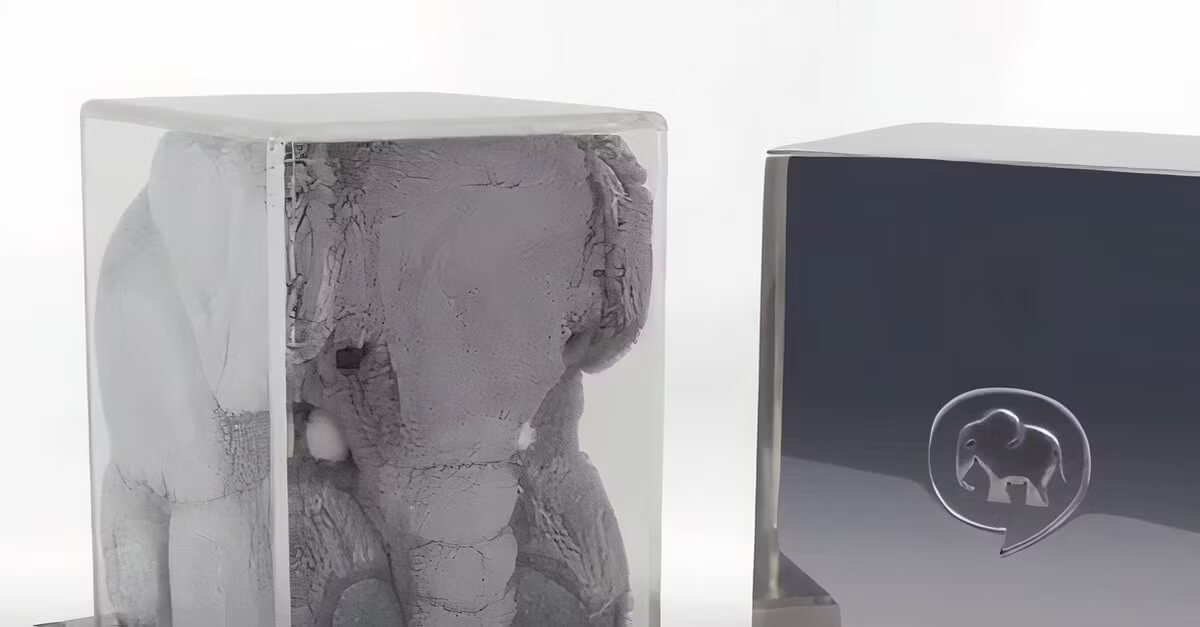Let’s break the Shark Tank fantasy right now. Not every inventive idea gets a Shark. And plenty shouldn’t. Case in point? Elephant Chat, pitched by Amanda and Jason Adams, rolled into Season 5 with a glass-encased stuffed elephant and a communication dream. The pitch was heartfelt, sure. But business? That’s another story. If you’re here for a Cinderella story, this isn’t it. But if you want the truth behind the pitch, heat, and fallout—read on.
Contents
ToggleThe Founders: Amanda and Jason Adams—Real Stakes, Real Risk
Amanda and Jason Adams weren’t some made-for-TV couple. They were a blended family grinding to make something work—at home and in business. That’s about as raw as you get on Shark Tank. They threw over $100,000 of their own money at Elephant Chat. Real skin in the game. Their goal? Tackle those elephant in the room moments all couples face.
Look, I respect couples who back their idea with everything they’ve got. That takes guts, not just optimism.

The Pitch: The Elephant in a Box—and in the Room
When the Adamses took the stage, it wasn’t just about a product. It was about their story. Elephant Chat was a literal plush elephant, locked inside a glass box—a tool for flagging tough conversations without starting World War III at the dinner table. You put the elephant somewhere visible. That’s the unspoken we need to talk.
Good premise. But simple ideas can be risky: Will people pay? (Especially $59 for a plush toy in a case?)
Their ask was $50,000 for 20% equity—giving the brand a $250,000 valuation right out the gate. Not nuts by Shark Tank standards, but you better have traction if you say you’re worth a quarter-million.
Sharks’ Verdict: Tough Love, No Bites
None of the Sharks bit. Not Lori, not Daymond, not Robert, not Cuban, not even Kevin (and he loves anything with a buck attached). Here’s why:
- High production cost—$22 per unit. That’s not sustainable unless the demand is insane.
- Retail price—$59 for a stuffed animal is aggressive. It’s the kind of sticker shock that’ll lose even the softest spouse.
- Market? Too narrow. Most couples aren’t paying that to signal a fight or emotional talk.
- Background—The Sharks called out the Adamses for lacking a professional pedigree in therapy or counseling.
Kevin summed it up: You have a hobby, not a company. Brutal. Honest. True in this case.
Money Check: Elephant Chat’s Net Worth in 2025
Let’s not drag this out. As of 2025, Elephant Chat’s net worth is a clean $0. They’re out of business. No fancy pivot, no secret DTC play, no celebrity TikTok moment.
Once the show aired, sales didn’t pour in. The high price choked off orders, and the national TV moment didn’t lead to any Shark-esque deals on the side. If you visit the SharkWorth site, you’ll see exactly that—zero activity, no stock, nothing left to buy.
Where It All Broke Down: Lessons, Not Excuses
Let’s call the plays. Elephant Chat fell into three classic traps I’ve seen founders walk into again and again:
- Costs Killed Them: If your cost to make the product eats half or more of your retail, you’re dead on arrival—unless you’re the next Apple. Elephant Chat had a $22 cost and a $59 price. Room for profit? Barely, before you factor in retail margins, eComm ads, shipping, returns.
- Niche Market: Everyone loves a clever metaphor—the elephant in the room. But are enough people ready to drop $59 on awkward conversation insurance? No way. It’s not mainstream like Scrub Daddy. Bombas sells because EVERYONE wears socks. This is a specialty tool for blended families and couples with tough dynamics.
- Lack of Traction and Domain Credibility: Good intentions are great, but experts matter. The Sharks hammered the Adamses for not being therapists or communication specialists. In an industry built on trust, credentials move the needle. They didn’t have that proof or professional back-up.
Entrepreneurs get romantic about unique ideas. It’s the execution, not the clever metaphor, that pays the bills. Elephant Chat’s execution was too slow, too expensive, and too narrow.
The Fallout: What Happened After the Cameras Cut?
Here’s the tough part—the real cost wasn’t just financial. Less than six months after their national TV moment, Amanda filed for divorce. Their relationship unraveled right along with the business.
Look, mixing personal and business is always risky—but on Shark Tank, you’re under a microscope, and there’s real pressure. Elephant Chat didn’t just fail as a company; it cost the founders more than money. If you ever wonder why founders should have those tough talks early, just watch this episode.
That’s the side of entrepreneurship no one glamorizes. You bet the house, sometimes you lose more than cash.
Is There Life for Elephant Chat After Shark Tank?
Short answer: No. There has been zero sign of a revival, relaunch, or savior funding. Neither Amanda nor Jason have rebooted the brand. There are no new products, no fresh campaigns, and no comeback story brewing as of 2025.
If you see Elephant Chat pop up on resale or meme pages, it’s a relic—collector’s value, not a comeback in the making.
Hard Truths From The Tank: What Founders Should Steal From This Story
Every Shark Tank fail offers lessons for those with eyes to see:
- Bet Big, But Bet Smart: Investing over $100,000 before you nail product-market fit is a gamble few can afford. Validate with small numbers, then scale. You earn the right to go big.
- Cost Matters More Than Feelings: You can love your product, but if it’s not priced to move (or earn), you’re a fan club, not a business.
- Credentials Are Currency: In certain sectors, your background frames the product. Would you buy a medical device from someone with no medical background?
- Personal Stakes Are Real: Don’t let your business drown your life. The Sharks don’t just buy into a product—they buy the founder’s story, resilience, and credibility.
I’ve been in pitch rooms where great ideas died for less. And yes, sometimes the Sharks get it wrong. Here, they called it.
FAQs
Is Elephant Chat still in business after Shark Tank?
No, Elephant Chat shut down—the brand’s net worth is $0 as of 2025. The product is no longer produced or sold.
Why did no Sharks invest in Elephant Chat?
All five Sharks passed. They felt the product was too expensive, too niche, and didn’t have enough expert backing.
What problem did Elephant Chat try to solve?
It aimed to help couples—especially blended families—start tough conversations without open confrontation.
How much did Elephant Chat cost to make and sell?
Production cost: $22 per unit. Retail: $59. The Sharks found this pricing unsustainable for its market.
Did Elephant Chat help save any relationships?
There’s no evidence it did, and unfortunately, it didn’t save the founders’ marriage either.
What happened to the founders after the show?
Amanda and Jason Adams divorced less than six months after their Shark Tank episode aired. The business closed with their split.
Has anyone tried to bring Elephant Chat or a similar product back?
There’s no credible sign of a revival, rebrand, or similar product from Elephant Chat’s founders as of 2025.
Would the founders do anything differently if they could pitch again?
They haven’t gone public on this. But the lesson is clear—test, talk, price lean, and save partnerships for outside the TV lights.
Final Take: Shark Tank Exposes the Truth—Grit Isn’t Always Enough
Elephant Chat is a classic Shark Tank cautionary tale. Good intentions. A lot of skin in the game. But that doesn’t replace market demand, price that makes sense, or the right founder background.
Shark Tank glamorizes the pitch, but building something that lasts? That’s way harder. Amanda and Jason put it all on the line—for love and business. The pitch was honest, the hustle was real, but the numbers never worked, and the casualties were personal, not just financial.
If you’re prepping a Shark Tank appearance or hustling your own side project, remember: money moves fast, and the market is even faster. Skip the metaphors—solve the pain, keep your costs low, and make sure your story doesn’t end after the pitch.
That’s the real lesson from Elephant Chat’s run on Shark Tank. Don’t just bring the elephant—bring a real business. Or you leave with nothing but a story for SharkWorth to archive.










